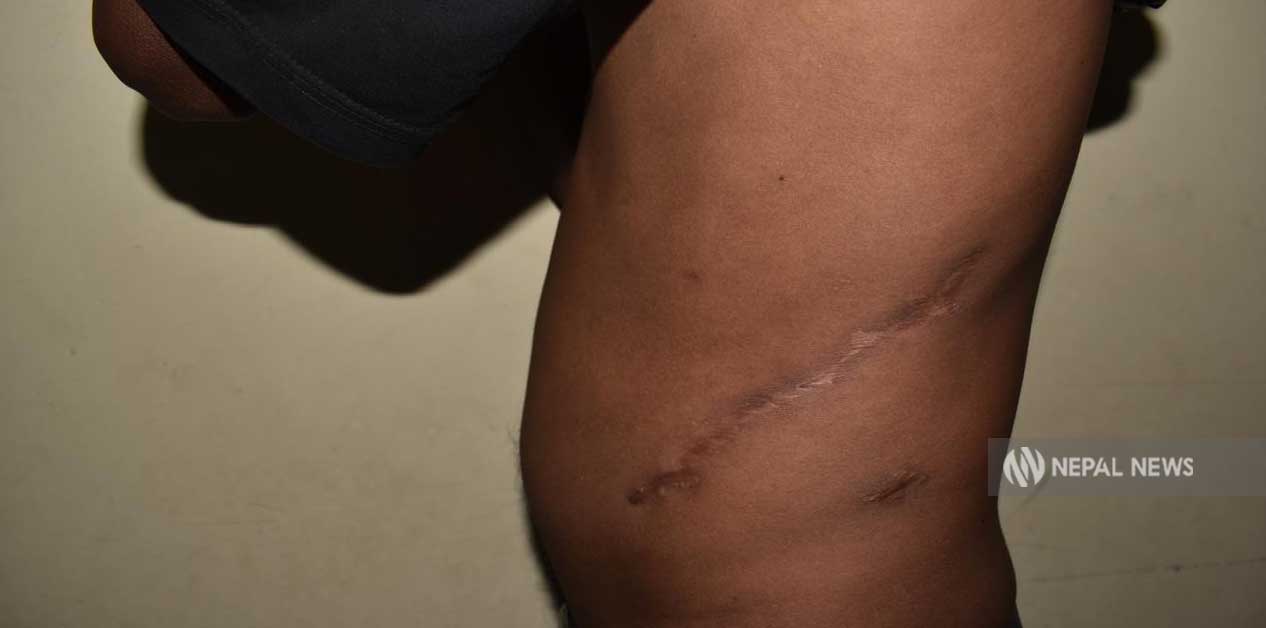

KATHMANDU: Sindhupalchok’s 48-year-old Shyam and his 47-year-old wife Gita Nepali (names changed) were working at a carpet factory in Balaju, Kathmandu.
They earned Rs 20,000–25,000 a month. Rent, food, and education for their two sons left them struggling to cover expenses.
In April 2022, while visiting relatives in Belkotgadhi Municipality-9, Nuwakot, Shyam met 24-year-old Sameer Nepali, who lived in New Road, Kathmandu.
After introductions, Sameer inquired about his work and income. Hearing Shyam’s story, Sameer said, “I can get you tailoring work in Goa, India, for INR 30,000–40,000 a month. If you’re interested, let me know.” Shyam took his number.
Back in Kathmandu, Shyam discussed it with his wife. She replied, “Let’s just keep working here.”
But poverty kept growing, while wages at the carpet factory remained stagnant.
After two years, in May 2024, Shyam called Sameer and met him in Machhapokhari. He said he was ready to go to Goa and asked for arrangements. Sameer agreed, but did not reveal much.
At their fourth meeting, Sameer offered something else: “In India you can sell a kidney. You’ll get Rs 600,000. You can survive with one kidney.”
Shyam hesitated: “Sell a kidney?” Sameer reassured him, saying donating kidneys also earned religious merit, and promised Rs 25,000 per referral.
Shyam told his wife, who initially refused. But constant discussions about poverty kept circling back to money and kidneys.
One night, lying in bed, the couple decided: “If we live, we’ll live together. If we die, we’ll die together. Let’s both sell our kidneys.”
The next day, Shyam informed Sameer, who took him to a New Road clinic for blood tests. When results showed no kidney problems, preparations began for India.
A week later, Sameer called: “Your flight is at 11 a.m. Be ready, I’ll bring a taxi.” That morning, they were handed tickets for Bangalore with a Delhi transit.
Never having flown before, they boarded Air India. At Bangalore airport, a man picked them up, took them by taxi for 90 minutes to a three-story hotel, and kept them on the top floor. “Don’t go outside, the police may question you,” he warned.
The next day, agents took them to a clinic for blood, urine, X-ray, and ultrasound tests. Once confirmed healthy, they were transported to a Hyderabad hospital.
“We were told to lie in bed. They made us unconscious and removed our kidneys,” Shyam recalls. They woke up in pain.
They were kept at the hospital for six days until wounds healed, then shifted to another hotel for two days.
After recovery, the agents handed them Rs 10,000 each and railway tickets. They returned via Gorakhpur to Sunauli, where Sameer himself came to receive them. He put them on a bus to Kathmandu. When they asked for the rest of the money, Sameer said, “The buyer hasn’t paid yet.”
After two–three months, Sameer gave them Rs 1.1 million, withholding Rs 100,000.
On 5 August, the Anti-Human Trafficking Bureau arrested Sameer. After his arrest, Shyam and Gita went to police and revealed their ordeal.
During nearly two months in India for the kidney sale, they also lost their carpet factory jobs. Now they survive by running a small tailoring shop.
“I rarely get new clothes, I patch old ones,” Shyam told NepalNews, adding, “I often suffer stomach aches and nausea.”
Another victim in Chandigarh
Police also arrested Rajkumar Pariyar (35) of Panchkhal-10, Kavre, and Rakesh Nepali (47) of Belkotgadhi-4, Nuwakot.
They had taken a man from Sindhuli to Chandigarh via Sunauli.
Lured by a promise of Rs 10,000–20,000 monthly income, the victim was kept in an apartment, tested at a clinic, and on 24 July his left kidney was removed at a Chandigarh hospital.
On 30 July, he was given Rs 10,000 travel money and sent back to Kathmandu—without the promised Rs 600,000.
He then filed a complaint at the Anti-Human Trafficking Bureau. “After three were arrested, the Dalit couple learned and also came forward,” said Bureau Chief SSP Krishna Prasad Pangeni.
According to Pangeni, the accused were running an organized racket across Nepal and India, targeting economically weak people and transporting them to Bangalore, Kolkata, and Chandigarh.
Even last year, two cases had been reported. Many complainants are from Dalit communities.
So far, police say three more Nepalis are involved. “Preliminary investigations show the group has taken 50–60 people to India for kidney removal,” Pangeni said.
Since 2019, 14 people have filed kidney-trafficking complaints with the Bureau. So far, 38 people have been arrested.
Even brokers don’t have kidneys
The arrested traffickers’ story itself is tragic—two of them are missing one kidney.
Police revealed Rajkumar sold his kidney in Kolkata nine–ten years ago for Rs 300,000, taken there by Narayan Mijar, who is still wanted. Afterward, Rajkumar joined the racket, luring poor people into selling.
Sameer was drawn in by Rakesh two years ago. Promised a job in India, he was instead persuaded to sell a kidney in Chandigarh, earning Rs 700,000. Since then, he too became active in trafficking.
Rakesh, however, never sold his kidney—his health tests disqualified him.
Legal barriers and illegal trade
By law, taking someone to another country for organ removal is human trafficking.
Nepal’s Human Trafficking and Transportation (Control) Act 2007 provides up to 10 years in prison.
The Human Organ Transplantation Regulations 2016 allow donation only by close relatives with mutual consent, and only if doctors certify the donor will not die or be permanently disabled.
According to Dr. Premraj Gyawali of Grande Hospital, many Nepalis go to India for kidney transplants, but 99% of donors there are “fake.”
“Patients search for relatives here. When they can’t find one, they turn to such illegal routes,” he said.
Nepal’s law also allows transplants from brain-dead donors, with family consent.
In 2020, five people—including the CEO and legal advisor of Nidan Hospital, a doctor, an official, and a recipient—were arrested for faking kinship documents to conduct a transplant. Since then, no such case has officially surfaced, Pangeni said.